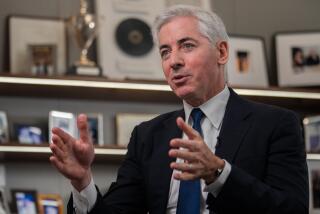Reagan’s former budget director is accused of fraud
- Share via
NEW YORK -- David Stockman was back in the woodshed Monday, this time for allegedly masterminding an investment fraud.
As a youthful White House budget director in 1981, Stockman was famously scolded by President Reagan for disagreeing with his economic policy.
The situation was more somber Monday: Stockman, 60, was charged with criminal securities fraud, bank fraud and other charges stemming from the bankruptcy of auto-parts maker Collins & Aikman Inc. of Troy, Mich., where he was chief executive. He could face as many as 30 years in prison on the most serious count of bank fraud.
The U.S. attorney’s office in Manhattan accused Stockman of using bogus accounting to keep the ailing company afloat and preserve his image.
“Stockman did not only have money at stake,” U.S. Atty. Michael Garcia said at a news conference in Manhattan. “His reputation was on the line as well.”
Stockman pleaded not guilty and was released on $1 million bail. In an interview, he vehemently denied the allegations, saying he showed his faith in the company by purchasing its shares repeatedly from August 2002 to December 2004.
“I was buying stock on the open market on 150 occasions because I believed we could turn the corner even though it was tough,” Stockman said.
The company’s failure cost him $13 million, he said, and cost his private equity firm nearly $350 million. He also said he used his own money to pay for employee Christmas parties and for meals for executives working overtime.
“I took millions of dollars out of my pocket to help the company meet expenses that it couldn’t afford, which is just the opposite of the normal guy fleecing shareholders,” he said. “The thing the government can’t explain is why did I start an [alleged] crime spree at 55 when I had led a life as a good citizen.”
A former congressman from Michigan, Stockman gained fame as Reagan’s boy-wonder budget director: a bespectacled figure in his early 30s carrying a black binder packed with arcane details of the federal budget.
Stockman played a central role in crafting fiscal strategies to promote Reagan’s vision of “supply side” economics, in which strategic tax cuts would pay for themselves by spurring more economic activity.
Yet he concluded early on that political realities were making a sham of his stated objectives, according to his 1986 book “The Triumph of Politics: Why the Reagan Revolution Failed.”
Desperate to make progress anyway, Stockman resorted to gimmickry when the numbers did not add up.
“He submitted a budget that, to use his own phrase, had a ‘magic asterisk’ in it -- a line item of cuts that were to come but never did,” recalled William A. Galston, a senior fellow in politics at the Brookings Institution. As he publicly extolled the White House strategy, Stockman privately recognized the problems emerging. He began talking candidly with journalist William Greider, and in December 1981, the Atlantic Monthly published “The Education of David Stockman.”
The piece featured Stockman’s memorable comment: “None of us really understands what’s going on with all these numbers.”
The president took his cocky budget director “to the woodshed,” as Stockman described it, but did not fire him. Indeed, Stockman remained in the job for almost four more years.
Galston said Stockman’s White House legacy was that of “an intelligent, hardworking, dedicated public servant who executed a policy in which he didn’t fully believe, executed it in a somewhat misleading way, and had enough conscience to spill the beans to a reporter about what he did.”
After leaving the government, Stockman headed a private-equity firm that took a 40% stake in Collins & Aikman, which sold parts to General Motors Corp. and others.
According to the indictment, Stockman improperly accounted for rebates from Collins & Aikman suppliers to make its financial operations look stronger than they were. That misled investors, staved off creditors and allowed the company to keep borrowing to sustain its operations, the government said.
The improper accounting occurred from December 2001 through May 2005, when Collins & Aikman filed for bankruptcy protection, the government said.
According to the indictment, the scheme began to unravel in late 2004, when Collins & Aikman’s auditor, KPMG, grew suspicious of its accounting.
In March 2005, Stockman headed an internal investigation to study the rebates, but he worked to direct the probe and its findings to hide the warped accounting, the indictment alleged.
Stockman, who now lives in Greenwich, Conn., said that it was his obligation as CEO to take charge of the probe and that he did not hide anything.
jonathan.peterson@latimes.com
*
Hamilton reported from New York and Peterson from Washington.
Bloomberg News was used in compiling this report.
More to Read
Inside the business of entertainment
The Wide Shot brings you news, analysis and insights on everything from streaming wars to production — and what it all means for the future.
You may occasionally receive promotional content from the Los Angeles Times.










